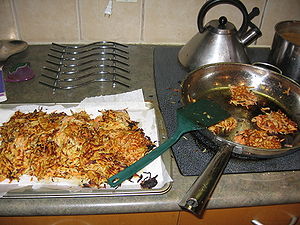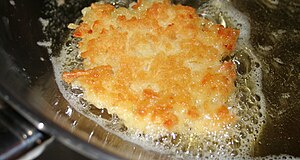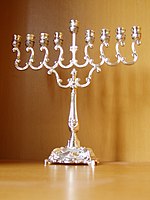Potato pancake




Potato pancakes, also known as latkes or latkas (Yiddish: לאַטקעס, Hebrew: לביבה levivah, plural לביבות levivot), are shallow-fried pancakes of grated potato and egg, often flavored with grated onion. Potato pancakes may be topped with a variety of condiments, ranging from the savory (such as sour cream) to the sweet (such as applesauce or sugar), or they may be served ungarnished. Potato pancakes are sometimes made from mashed potatoes to produce pancake-shaped croquettes.[1]
Potato pancakes are commonly associated with traditional Polish, Ukrainian, Yiddish, Austrian, German, Hungarian and Czech cuisine, although other cuisines (including those of India and Korea) also have similar potato pancakes.[2][dead link] It is also the national dish of Belarus. In Ukrainian, Belarusian, and Russian cuisines potato pancakes are commonly known as deruny (Template:Lang-ua) or draniki (Russian: драники, Belarusian: Дранікі). Throughout Germany, potato pancakes are also very much liked, most commonly under the names Reibekuchen or Kartoffelpuffer, and they are eaten either salty as a side dish or sweet with apple sauce[3] and cinnamon; they are a very typical menu item during outdoor markets and festivals in the colder seasons.
A form of potato pancake known as 'Boxty' is a popular traditional dish in most of Ireland. It is made in a similar way but using more starch.
The Swedish version of unbound potato pancakes are called rårakor.[4] When prepared with a batter of wheat flour, milk, egg, and shredded potatoes and fried like thin pancakes, they are called raggmunk, which literally translates as "hairy doughnuts" (the grated potatoes make them look hairy).[5] Both kinds are enjoyed with fried bacon and lingonberry jam.
Hanukkah tradition
Latkes are traditionally eaten by Ashkenazi Jews during the Jewish Hanukkah festival. The oil for cooking the latkes is reminiscent of the oil from the Hanukkah story that kept the Second Temple of ancient Israel lit with a long-lasting flame that is celebrated as a miracle.
The word leviva, the Hebrew name for latke, has its origins in the Book of Samuel's description of the story of Amnon and Tamar.[6] Some interpreters have noted that the homonym levav means "heart," and the verbal form of l-v-v occurs in the Song of Songs as well.
